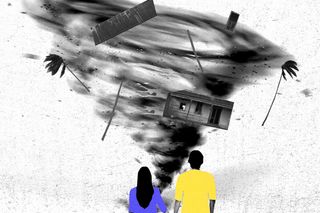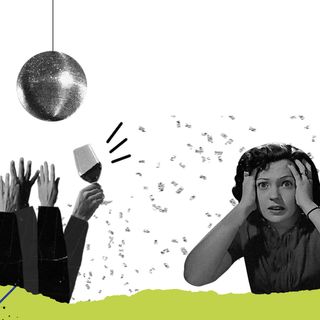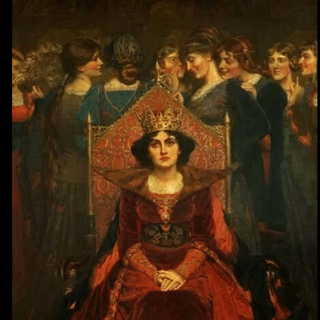
Why Couples Tend to Grow Closer During Natural Disasters
Researchers saw the biggest jumps in relationship satisfaction among couples who were the most unhappy before disasters like hurricanes.

Remember 2012, the cinematic end of the world? One story was that of Jackson (played by John Cusack), a California-based writer, separated from Kate (played by Amanda Peet), his former wife with a new boyfriend. The world cracked, everyone raced towards the ark. Between limousines, planes, and earthquakes, Jackson and Kate rekindled their love.
Romance powered by an apocalypse has psychological backing. According to a recent study, natural disasters bring married couples closer — even if for a little while. In other words, going through a stressful event made couples happier. And this interplay also holds lessons about intimacy, relationships, and modern stressors.
Published in Psychological Science this week, the research looked at 231 couples who had lived through Hurricane Harvey that hit Texas in 2017. The researchers had surveyed them once before the hurricane when they were newly married, and now revisited their relationships. “We originally set out to study the effects of everyday stressors, such as financial problems and the transition to parenthood, on couples in the early years of their marriage,” said lead author Hannah Williamson, assistant professor of human development and family sciences at the University of Texas at Austin.
“When the hurricane hit in the middle of the study, it allowed us to look at the effects of a major acute stressor. Unfortunately, more and more people are going through disasters such as hurricanes and wildfires.”
This satisfaction boost in couples was surprising. Because of a “stress spillover” element in relationships, any everyday stress (and a disaster would be the extreme kind), can decrease a partner’s sense of well-being within their relationship. In Tum Mile (2009), Emraan Hashmi and Soha Ali Khan called it quits on round one of their relationships because Hashmi’s economic difficulties spiraled into ego issues and fights.
This could be one reason why divorce rates and breakups rose substantially during the pandemic. “More people are finding themselves trapped in a situation where they are struggling to cope with what is going on for them as well as what is going on between them. Like a pressure cooker that does not let any pressure out, the lid can eventually pop and the relationship breaks down,” Ronen Stilman, a psychotherapist, told BBC.
But in the current study, the researchers “saw the biggest jumps in relationship satisfaction among the couples who were the most unhappy before the hurricane.” In other words, couples experienced a significant boost in relationship satisfaction.
Related on The Swaddle:
Long‑Term Couples Can Develop Biological Similarities, Shows Study
One instinctive reason could be that a disaster changes how people view themselves and their relationships. “A natural disaster can really put things in perspective. People realize how important their partner is to them when they are jolted out of the day-to-day stress of life,” Williamson said. Even Hashmi and Khan, when waiting out the Maharashtra floods of 2005 together, had a chance to reflect on their relationship and had an epiphany.
Or, how people react through disasters becomes a more credible version of them the partner would want to remember. For instance, a 2012 study showed men showed greater social, friendly, and cooperative behavior under acute stress. “Acute stress may help remind us of a fundamental truth: our common humanity. Understanding our shared vulnerability — life makes no promises — may be frightening, but it can inspire kindness, connection, and desire to stand together and support each other.” Think of the adventures of Keanu Reeves and Sandra Bullock in Speed (1994); the duo tries to diffuse a serious situation while letting love bloom. As Reeves’ character says, “I should warn you. I’ve heard that relationships based on intense experiences don’t work.” And then they kiss till the crowds come calling.
Why people’s behavior may itself change can be explained through the “syndromal continuity” theory. “Whoever a person is in ‘normal’ routine, low-stress situations, that person becomes a virtual caricature of him/herself under stress,” researcher Theodore Millon argued. So, a person who is normally quiet may become avoidant and isolative under stress. Heroic people become true heroes in disasters. An insecure person may become jealous. A person who is usually aggressive may become abusive and violent. The “caricatured” version springs to action due to feeling helpless in a disaster situation.
Even the added vulnerability during disasters changes relationship dynamics. Imagine a break-up overlapping with a demotion or a personal loss; chances are the lack of control over things may make people lean into the comfort of others. As Brene Brown, a professor at the University of Houston Graduate College of Social Work and expert, explained: Vulnerability is a core ingredient of social bonding.
This satisfaction may come with a limited period. Over the year, couples’ levels of satisfaction reduced to pre-hurricane levels. Research has also shown that disasters may strengthen relationships in the short term, but may also leave them weaker in the long term. “The short-term (weeks) is often seen as the “heroic phase” where people come together to overcome a common challenge. Inevitably, however, the heroic phase morphs into a ‘disillusionment phase’ where bereavement and grief, post-traumatic stress, anger, guilt, self-medication, and even domestic violence can emerge,” PsychologyToday explained. “These reactions can attack even the best relationship at its core.”
In the end, how we stick together in times of crises holds lessons about navigating relationships in non-disaster situations. “There may be therapeutic applications to this if couples can shift their perspective in a similar way without having to go through a natural disaster,” Williamson added. For Jackson and Kate, a broken marriage and years’ worth of baggage mattered little when they went through the end of the world together.
Think of the perspective shift as a romantic “ding!” It can direct your attention to some traits but also eclipse others. Which way people look is something they decide based on their truth. But the takeaway seems to be, look more closely.
Saumya Kalia is an Associate Editor at The Swaddle. Her journalism and writing explore issues of social justice, digital sub-cultures, media ecosystem, literature, and memory as they cut across socio-cultural periods. You can reach her at @Saumya_Kalia.
Related


Is This Normal? “I Hate Parties”
